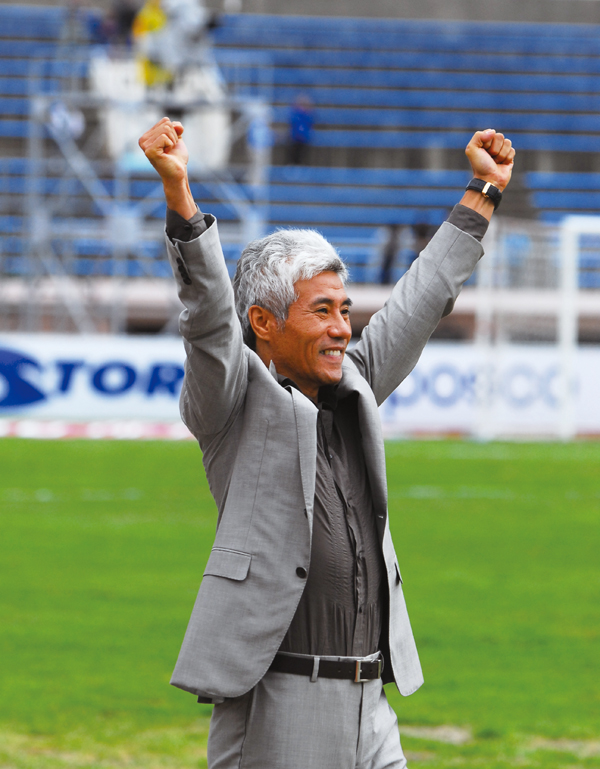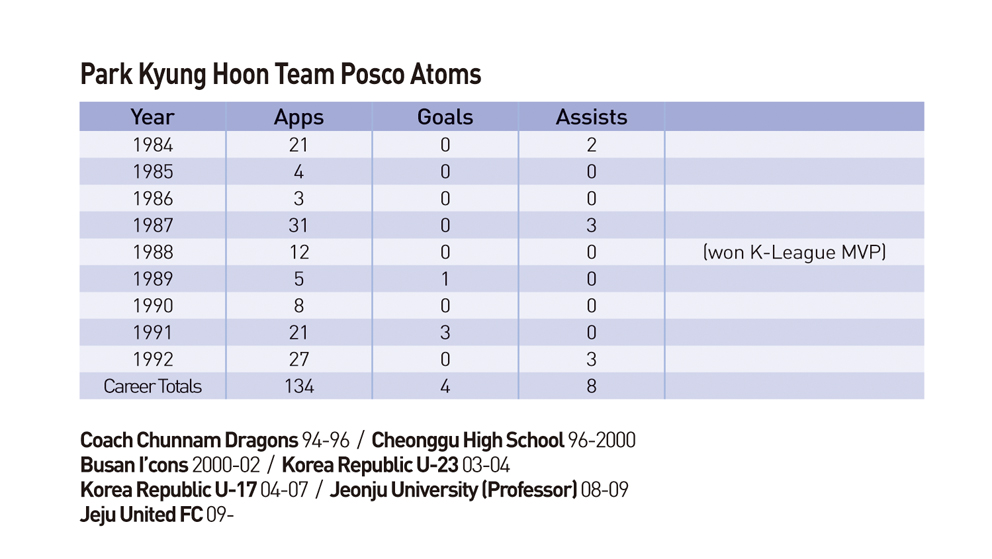
- Updated 2024.5.16 16:06
- All Articles
-
member
icon
-
facebook
cursor
-
twitter
cursor
|
CommunityInterviews |
United they standHead coach Park Kyung Hoon tells how a personal approach helped propel Jeju to No. 1 |
|
| |
 |
|
| ▲ Head coach Park Kyung Hoon celebrates during a match between Jeju United and the Pohang Steelers, Sept. 28. The match ended in a 1-1 draw. Photo courtesy Jeju United FC |
What a difference a year and a coach can make.
Last year, Jeju United was the second worst squad in the K-League, but after head coach Park Kyung Hoon took charge on Oct. 30 last year, United has risen to the top of the K-League table.
When Park arrived at Jeju, he was confronted with a down-and-out team who hadn’t made the playoffs since moving to the island in 2005, suffering many an embarrassing loss in the meantime. The first thing Park did when he came to United was “to rebuild the team and have a strong color as Jeju United.”
In his own words, the team “had really low self esteem and low confidence” when he arrived. After finishing no better than 10th in the past four years, it came as no surprise that the Jeju squad was lacking confidence.
To remedy this, Park said that it was necessary to first “build trust between the coach and players.” Watching the team practice, it was clear that Park has established that relationship and that he takes a very personal approach with his players. He was constantly active, running about, giving tips and shouting encouragement to all his players. It was rare to see him standing still and barking orders.
Using his active and personal approach, Park has looked to develop “a sense of color as Jeju United,” creating a new personality in the locker room, and on the pitch.
Jeju lacked cohesiveness last season, and frequently played backwards, but Park set out to “have a fast transition game” which he believes “is the currency of world football right now.” To do so, Park felt that it was necessary to train the team “to be quicker and put more pressure on the ball at all times, possessing the ball more so than last year.”
In addition to changing the philosophy behind the team, Park sought to bring in players that would change the dynamic
of the team, notably Captain Kim Eun Jung at striker, who came from Changsha Ginde of the Chinese Super League, midfielder Park Hyeon Beom and striker Bae Ki Jong from Suwon Samsung Blue Wings, and goalkeeper Kim Ho Jun and striker Lee Sang Hyup from FC Seoul.
Park noted that it is hard to coach professional players and rather than fixing his players’ weaknesses, he tried to maximize the strengths they already had using “a method of trusting and appraisal.”
It’s clear that Park’s work has paid off. Up until last week Jeju United sat in first place in the K-League, two points ahead of then second place FC Seoul. Jeju has already clinched a playoff spot and a place in next year’s AFC Champions League. Not bad considering Park’s goal at the beginning of the the season was simply “to be in the playoffs.”
Although United has gained prominence only recently, Park is no stranger to the spotlight. He spent 9 years in the K-League, all with the POSCO Atoms. He also accumulated 88 caps for the Korean Republic senior team, playing in two World Cups, ’86 in Mexico and ’90 in Italy. He said that “one of the most special experiences I had was defending Maradona” in ‘86, Korea Republic’s first appearance in the World Cup finals in 32 years. He was also the manager of Korea Republic’s U-17 men’s national team from 2004-2007, getting the opportunity to manage during the U-17 World Cup in Korea. He also has spent time on the coaching staff of the Chunnam Dragons, Busan I’cons, and the Korea Republic U-23 squad.
Park stated that when he first played in the World Cup in ‘86, “Korea was way behind the world soccer level.” These days, Korea is a significant power in Asia and gains prominence every year. Park thinks that for Korea to take it to the next level, Korea must improve “individual capacity and skill sets and needs to adjust better into world soccer trends.”
Although the K-League is not well known outside Asia, Park stated that “the K-League’s game has improved a lot in the past” and “is in a transition phase.” Even with the rise in the level of play in the K-League, attendance numbers are dismal compared to other major leagues around the world. Only two teams average over 15,000 fans a game, Suwon Samsung with 25,736 and Seoul FC with 30,069, respectively, as of the 29th round of the season. Park thinks that some of “the [K-League’s] problems originate from the coaches themselves. Coaches need to be coaching games more excitably and enjoyably.” If you have watched Jeju play this year, you know that Park takes this to heart. They have already scored 54 goals this year, with one game remaining. Last year, Jeju scored 31 goals total.
With the announcement of the 2022 World Cup bid on the horizon, Korea could find itself the center of the soccer world once again, without having to share the spotlight with Japan. Park thinks this is a great opportunity for Korea to “It would be good for promoting Korea to the world. Especially it’s culture and history.” He also mentioned that “It would help to develop Korean soccer, as happened after 2002 and help the K-League become a top league in Asia.”
Considering the remarkable turnaround that Park has engineered here on Jeju, it would be wise for the KFA to take a closer look at Jeju’s manager. He has quietly taken a perennial K-League bottom feeder straight to the top and might be just the man to do the same for the Korean national team in years to come. But right now, it seems that Park is comfortable right where he is on Jeju. He has a beautiful training ground, at least one decent home pitch, and a successful team to boot.
If you're trying to figure out the driving philosophy behind Jeju’s manager, turn to the finer things, as Park simply stated that “while music is the art of sound, and football is the art of creation.”
|
|
|
|
|
|
|
|
ⓒ Jeju Weekly 2009 (http://www.jejuweekly.net)
All materials on this site are protected under the Korean Copyright Law and may not be reproduced, distributed, transmitted, displayed, published without the prior consent of Jeju Weekly. |
|
|
|
|
| Jeju-Asia's No.1 for Cruise |
|
|
|
Title:The jeju Weekly(제주위클리) | Mail to editor@jejuweekly.net | Phone: +82-64-724-7776 Fax: +82-64-724-7796
#503, 36-1, Seogwang-ro, Jeju-si, Jeju-do, Korea, 63148
Registration Number: Jeju, Ah01158(제주,아01158) | Date of Registration: November 10,2022 | Publisher&Editor : Hee Tak Ko | Youth policy: Hee Tak Ko
Copyright ⓒ 2009 All materials on this site are protected under the Korean Copyright Law and may not be reproduced, distributed, transmitted, displayed, published
without the prior consent of jeju weekly.com.

|





















